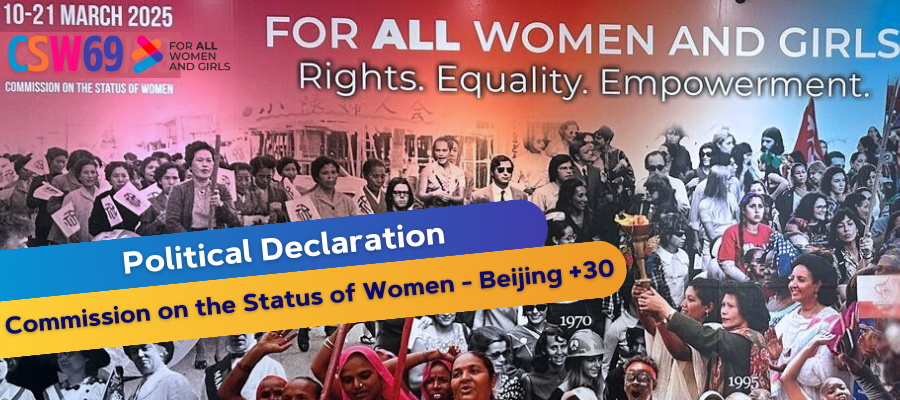
30 Years Since Beijing: Renewed Global Commitment to Gender Equality
In March 2025, global leaders convened at the 69th meeting of the Commission on the Status of Women (CSW69) to celebrate a historic occasion – the 30th anniversary of the Beijing Declaration and Platform for Action. Adopted in 1995, this historic document represents the most comprehensive global agenda for gender equality and the empowerment of women and girls. The CSW69 Political Declaration is a celebration of accomplishment but also a sobering call for action. Member States recommit to the Beijing Platform for Action with no country having fully achieved gender equality. It lays out key action items to expedite progress on gender equality – this document is a must-read for anyone committed to human rights and inclusive development.
What Has Been Achieved?
In over 30 years, the Beijing Platform has helped change national laws, policies, and cultural norms around the world. Countries have made progress in:
- Increasing access for women to education and health
- Increasing participation in work and decision making
- Dealing with violence against women and girls
- Raising awareness of women’s rights and contributions in all sectors
In addition, civil society, particularly women’s organizations, has been an important part of these advances in support of United Nations (UN) and global development agendas, including the Sustainable Development Goals (SDGs). They have have helped keep gender equality high on the world agenda.
What Did Countries Recommit To?
The declaration lays out an ambitious vision for the next phase of progress. Governments committed to:
- Full implementation of the Beijing Platform and complementary human rights treaties
- Eliminate of discriminatory laws, stereotypes, and structural inequalities
- Ensure universal access to health, education, and social protections,
- Close the gender pay gap, support women’s economic opportunities and care policies,
- Address gender-based violence; both offline and online,
- Support women’s leadership and digital inclusion, and climate resilience,
- Invest in gender-responsive budgets and data to inform policy development.
There is also a strong emphasis on intersectionality, recognizing that women and girls that are marginalized (Indigenous, rural, migrant, disabled or living in conflict) endure compounded discrimination.
Where Are the Gaps?
Although the declaration signifies some progress, it also makes clear that inequality remains widespread. The journey toward equality continues to be long and uneven, whether related to the poverty rate among women, their presence in positions of power, or various other concerning indicators.
Significant challenges include:
- Gender-based violence and harassment,
- Unequal access to resources and opportunities,
- Negative social norms and gender stereotypes,
- Inadequate sustained funding for gender equality, and
- Limited political will in some areas.
The declaration also recognizes new and emerging challenges, from the digital divide and climate change to recovering from the pandemic, that have disproportionately affected the lives of women and girls.
A Call to Action
The 2025 Political Declaration is more than a reaffirmation — it is a call to action. It directs governments, the UN, civil society, youth, men and boys, and all in the suite of stakeholders to take bolder, faster action on closing the gaps and achieving a gender-equal future. For those who are working on the frontlines or connecting with communities, reading the full declaration will provide further insights and approaches. It is not only a policy — it is a roadmap for justice, equity and enduring change.
Read the full CSW69 Political Declaration HERE. Choose your language when downloading.
Author: Asmita Basnet, virtual youth intern
